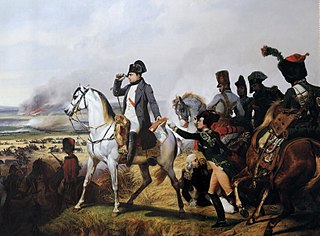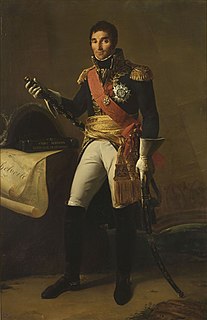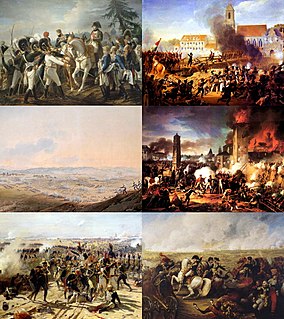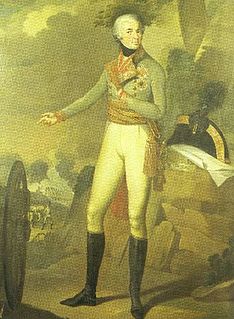| |||||
| Decades: | |||||
|---|---|---|---|---|---|
| See also: | Other events of 1809 History of France • Timeline • Years | ||||
Events from the year 1809 in France.
| |||||
| Decades: | |||||
|---|---|---|---|---|---|
| See also: | Other events of 1809 History of France • Timeline • Years | ||||
Events from the year 1809 in France.

Archduke Charles Louis John Joseph Laurentius of Austria, Duke of Teschen was an Austrian field-marshal, the third son of Emperor Leopold II and his wife, Maria Luisa of Spain. He was also the younger brother of Francis II, Holy Roman Emperor. Despite being epileptic, Charles achieved respect both as a commander and as a reformer of the Austrian army. He was considered one of Napoleon's more formidable opponents and one of the greatest generals of the French Revolutionary Wars.

1809 (MDCCCIX) was a common year starting on Sunday of the Gregorian calendar and a common year starting on Friday of the Julian calendar, the 1809th year of the Common Era (CE) and Anno Domini (AD) designations, the 809th year of the 2nd millennium, the 9th year of the 19th century, and the 10th and last year of the 1800s decade. As of the start of 1809, the Gregorian calendar was 12 days ahead of the Julian calendar, which remained in localized use until 1923.

Eugène Rose de Beauharnais, Duke of Leuchtenberg was a French nobleman, statesman, and military commander who served during the French Revolutionary Wars and the Napoleonic Wars.

The Battle of Eckmühl, fought on 22 April 1809, was the turning point of the 1809 Campaign, also known as the War of the Fifth Coalition. Napoleon I had been unprepared for the start of hostilities on 10 April 1809, by the Austrians under the Archduke Charles of Austria and for the first time since assuming the French Imperial Crown had been forced to give up the strategic initiative to an opponent. Thanks to the dogged defense waged by the III Corps, commanded by Marshal Davout, and the Bavarian VII Corps, commanded by Marshal Lefebvre, Napoleon was able to defeat the principal Austrian army and wrest the strategic initiative for the remainder of the war.

The Battle of Wagram was a military engagement of the Napoleonic Wars that ended in a costly but decisive victory for Emperor Napoleon's French and allied army against the Austrian army under the command of Archduke Charles of Austria-Teschen. The battle led to the breakup of the Fifth Coalition, the Austrian and British-led alliance against France. Wagram was the largest battle in European history up to its time.

André Masséna, Prince of Essling, Duke of Rivoli was a French military commander during the French Revolutionary Wars and the Napoleonic Wars. He was one of the original 18 Marshals of the Empire created by Napoleon I, with the nickname l'Enfant chéri de la Victoire.

The Napoleonic era is a period in the history of France and Europe. It is generally classified as including the fourth and final stage of the French Revolution, the first being the National Assembly, the second being the Legislative Assembly, and the third being the Directory. The Napoleonic era begins roughly with Napoleon Bonaparte's coup d'état, overthrowing the Directory, establishing the French Consulate, and ends during the Hundred Days and his defeat at the Battle of Waterloo. The Congress of Vienna soon set out to restore Europe to pre-French Revolution days. Napoleon brought political stability to a land torn by revolution and war. He made peace with the Roman Catholic Church and reversed the most radical religious policies of the Convention. In 1804 Napoleon promulgated the Civil Code, a revised body of civil law, which also helped stabilize French society. The Civil Code affirmed the political and legal equality of all adult men and established a merit-based society in which individuals advanced in education and employment because of talent rather than birth or social standing. The Civil Code confirmed many of the moderate revolutionary policies of the National Assembly but retracted measures passed by the more radical Convention. The code restored patriarchal authority in the family, for example, by making women and children subservient to male heads of households.

In the Battle of Aspern-Essling, Napoleon crossed the Danube near Vienna, but the French and their allies were attacked and forced back across the river by the Austrians under Archduke Charles. It was the first time Napoleon had been personally defeated in a major battle, as well as his first defeat in a decade. Archduke Charles drove out the French but fell short of destroying their army. The Austrian artillery dominated the battlefield, firing 53,000 rounds compared to 24,300 French. The French lost over 20,000 men including one of Napoleon's ablest field commanders and closest friends, Marshal Jean Lannes.

The War of the Fifth Coalition was a European conflict in 1809 that was part of the Napoleonic Wars and the Coalition Wars. The main conflict took place in central Europe between the Austrian Empire of Francis I and Napoleon's French Empire. The French were supported by their client states, including the Kingdom of Italy, the Confederation of the Rhine and the Duchy of Warsaw. Austria was supported by the Fifth Coalition which included the United Kingdom, Portugal, Spain and the Kingdoms of Sardinia and Sicily, though the latter two took no part in the fighting. By the start of 1809 much of the French army was committed to the Peninsular War against Britain, Spain and Portugal. After France withdrew 108,000 soldiers from Germany, Austria attacked France to seek the recovery of territories lost in the 1803–1806 War of the Third Coalition. The Austrians hoped Prussia would support them as their former ally, but Prussia chose to remain neutral.
Napoleon Bonaparte was a French military and political leader who rose to prominence during the latter stages of the French Revolution and the Napoleonic Wars.

The Battle of Ratisbon, also called the Battle of Regensburg, was fought on 23 April 1809, during the Napoleonic Wars, between the army of the French Empire, led by Napoleon I, and that of the Austrian Empire, led by Archduke Charles. Scene of the last engagement of the Bavaria phase of the campaign of 1809, the brief defense of the city and installation of a pontoon bridge to the east enabled the retreating Austrian army to escape into Bohemia. During the assault, Marshal Jean Lannes led his troops up ladders onto the walls, and Napoleon was wounded in his ankle by a small artillery round. The shot had been fired at great distance and did not severely hurt the Emperor, but caused a contusion.

Louis Aloysius, Prince of Hohenlohe-Waldenburg-Bartenstein was a German prince and Marshal of France. He commanded a division of Austrian soldiers in the 1809 and 1814 campaigns during the Napoleonic Wars.

Johann Baron von Hiller was an Austrian general during the French Revolutionary Wars and the Napoleonic Wars. He held an important command during the 1809 campaign against France, playing a prominent role at the Battle of Aspern-Essling.

The military career of Napoleon Bonaparte spanned over 20 years. As military leader, he led the French armies to defeat in the Napoleonic Wars. Despite his losing war record and ending in defeat, Napoleon is regarded in Europe as a military genius and one of the finest commanders, his wars and campaigns have been studied at military schools worldwide. He fought more than 70 battles, losing only nine, mostly at the end when the French army was not as dominant. The French dominion collapsed rapidly after the disastrous invasion of Russia in 1812. Napoleon was defeated in 1814 and exiled to the island of Elba, before returning and was finally defeated in 1815 at Waterloo. He spent his remaining days in British custody on the remote island of St. Helena.

Johann Josef Cajetan Graf von Klenau, Freiherr von Janowitz was a field marshal in the Habsburg army. Klenau, the son of a Bohemian noble, joined the Habsburg military as a teenager and fought in the War of Bavarian Succession against Prussia, Austria's wars with the Ottoman Empire, the French Revolutionary Wars, and the Napoleonic Wars, in which he commanded a corps in several important battles.

Friedrich Franz Xaver Prince of Hohenzollern-Hechingen was an Austrian general. He joined the Austrian military and fought against the Kingdom of Prussia, Ottoman Turkey, and the First French Republic. He was promoted to the rank of general officer during the French Revolutionary Wars. During the Napoleonic Wars, he led a division in 1805 and an army corps in 1809. He was Proprietor (Inhaber) of an Austrian cavalry regiment from 1802 to 1844.

Jean-Marie-Pierre-François Doursenne, called Dorsenne, count Lepaige was a French military officer of the French Revolutionary Wars and the Napoleonic Wars. He eventually became one of the senior commanders in the Imperial Guard.

Nicolas-Marie Songis des Courbons, Count of the Empire,, was a French artillery commander during the French Revolutionary Wars, who rose to the rank of General of Division in 1800 and served as commander of the Grande Armée artillery between 1805 and 1809, during the Napoleonic Wars.
The Imperial Austrian Army formed the land forces of the Austrian Empire. It arose from the remains of the Imperial Army of the Holy Roman Emperor after the dissolution of the Imperial Army and went in 1867 into the Joint Army of Austria-Hungary and the k.k. Landwehr over. In addition to the army, there was also the Austrian Navy. The army took part in the Napoleonic Wars until 1815, the First Italian War of Independence, the Hungarian Revolution of 1848, the Second Italian War of Independence, the Second Schleswig War, the Third Italian War of Independence and the Austro-Prussian War. Notable generals were Josef Radetzky, Karl Philipp of Schwarzenberg, Archduke Charles, Duke of Teschen, Frederick Bianchi and Julius von Haynau.